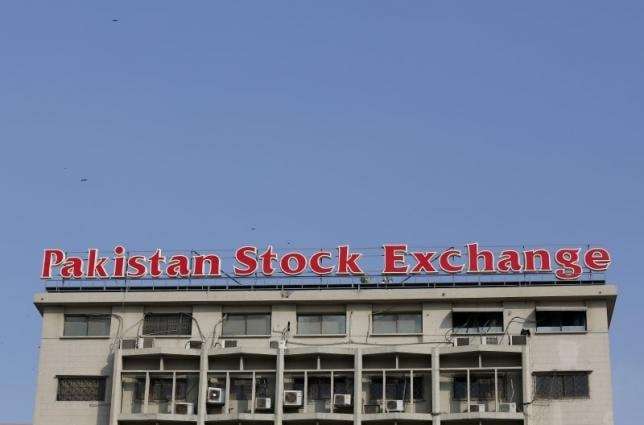
|
Getting your Trinity Audio player ready...
|
Introduction
The Pakistan Stock Exchange (PSX) experienced significant volatility on Tuesday, as the benchmark KSE-100 index dropped by 1,510 points, or 1.33%. The market sentiment turned bearish, fueled by profit-taking activities, geopolitical uncertainties, and global oil price fluctuations. Investors and analysts highlighted multiple factors contributing to the downturn, including the approaching rollover of futures contracts and uncertainty surrounding the political landscape in Pakistan.
Early Optimism Shattered by Profit-Taking
At the start of the trading session, the KSE-100 index surged by over 1,100 points, reflecting early optimism among market participants. This rally was primarily driven by positive news surrounding the country’s economic outlook and the political stability provided by ongoing talks between the government and opposition party Pakistan Tehreek-e-Insaf (PTI).
However, this initial optimism quickly reversed, and the index soon plummeted by 1,629 points, as investors opted to take profits, particularly those who had held onto positions during the previous days’ rally.
Reasons for the Decline
Profit-Taking and Futures Contracts Roll-Over
Analysts pointed to profit-taking as a significant reason behind the market’s sudden reversal. Investors, who had benefited from the previous rally, began trimming their positions ahead of the approaching rollover of futures contracts. The contract rollover, scheduled for the end of the month, added a layer of uncertainty to the market, driving investors to become more cautious.
Political Uncertainty
Another factor contributing to the market’s decline was the ongoing uncertainty surrounding political negotiations between the government and PTI. While there was some optimism that these talks could lead to a resolution, the prolonged political instability created a risk-off sentiment among investors.
External Economic Factors: Falling Global Oil Prices
The fall in global oil prices also played a critical role in exacerbating the downward trend. With crude oil prices witnessing a notable decline, the market sentiment was affected by concerns over reduced earnings for energy companies. Moreover, the weakening of the Pakistani rupee added further pressure on the stock market, as it increased the cost of imports and fueled inflationary concerns.
Key Market Drivers and Impact
Volatility and Investor Caution
As the market continued to witness volatility, caution prevailed among investors, with trading volumes and values fluctuating throughout the session. Despite the sharp decline in the index, there was still active trading, with a total of 881 million shares changing hands, valued at Rs 54 billion. The cautious sentiment was reflected in the broader market performance, where 288 stocks closed lower, compared to just 71 that rose.
Institutional Selling and Overbought Shares
Institutional investors, too, played a significant role in the market’s downturn, with many opting to sell overbought shares. This institutional selling helped fuel the negative momentum, with sectors such as fertiliser, petroleum, and financial services leading the losses.
Sector-Specific Laggards
Several stocks emerged as significant laggards during the session, with companies like Fauji Fertiliser Company, Mari Petroleum, MCB Bank, Hub Power, and Engro Corporation dragging the index down by a combined 850 points. These losses in key stocks had a profound impact on the broader market, further exacerbating the downward trend.
Fauji Fertiliser Company (-3.65%)
Mari Petroleum (-3.37%)
MCB Bank (-3.84%)
These companies were among the most notable decliners of the day, with weak performance attributed to both sector-specific issues and broader market sentiment.
Stock Performers: UBL, Dawood Hercules, and Sui Northern Gas
On the flip side, stocks like UBL, Dawood Hercules Corporation, and Sui Northern Gas Pipelines Ltd provided some positive movement, contributing to the overall index. These stocks managed to post gains despite the market’s negative sentiment.
UBL (+2.72%)
Dawood Hercules Corporation (+3.3%)
Sui Northern Gas Pipelines Ltd (+6.35%)
Macroeconomic Factors and Market Outlook
Despite the decline, analysts remain hopeful about the medium-to-long-term outlook for the Pakistani stock market. Positive macroeconomic indicators such as a current account surplus, increased foreign investment, and a rise in remittances continue to provide a supportive environment for growth.
JS Global Analysis on the Market Decline
JS Global analyst Muhammad Hasan Ather commented on the downturn, noting that the sharp decline was primarily driven by profit-taking following a positive two-day rally. He pointed out that despite the market’s retreat, the KSE-100 index had touched a high of 115,036 earlier in the day, reflecting the potential for continued investor confidence.
Ather believes that the market’s longer-term outlook remains optimistic, citing improving economic fundamentals such as a higher foreign investment rate and stable macroeconomic conditions.
PSX Performance Summary:
- KSE-100 Index: Declined by 1,510 points or 1.33%, closing at 112,414.81
- Trading Volume: 880.6 million shares, higher than the previous day’s 857.8 million
- Market Value: Rs 54 billion
- Foreign Investment: Foreign investors sold shares worth Rs 617.8 million
- Top Gainers: UBL, Dawood Hercules Corporation, Sui Northern Gas Pipelines
- Top Laggards: Fauji Fertiliser Company, Mari Petroleum, MCB Bank
Foreign Investment Impact
According to the National Clearing Company of Pakistan, foreign investors sold Rs 617.8 million worth of shares, contributing to the market’s bearish sentiment. This activity underscores the cautious approach taken by international investors, who are wary of the prevailing market volatility.
FAQs
1. What caused the significant drop in the PSX on Tuesday?
The decline was primarily attributed to profit-taking, the rollover of futures contracts, political uncertainties, and falling global oil prices. Institutional selling and concerns over leverage positions added further pressure.
2. How did political uncertainty impact the market?
Political instability, particularly the ongoing talks between the government and PTI, contributed to investor caution and uncertainty, prompting profit-taking activities.
3. What sectors were most affected by the market downturn?
The fertiliser, petroleum, and financial services sectors were significantly affected, with major companies like Fauji Fertiliser and Mari Petroleum posting substantial losses.
4. What is the outlook for the Pakistani stock market?
Despite the short-term volatility, the outlook for the market remains positive, supported by improving macroeconomic indicators and foreign investment.
5. How did foreign investors react to the market decline?
Foreign investors sold Rs 617.8 million worth of shares, reflecting their cautious approach in light of market volatility and political uncertainties.
Conclusion
The PSX’s performance on Tuesday highlighted the volatility that characterizes emerging markets. While profit-taking and external factors like falling oil prices have contributed to the market’s short-term decline, the underlying macroeconomic fundamentals suggest a more optimistic long-term outlook. Investors are urged to stay cautious in the face of uncertainty while keeping an eye on broader economic trends and political developments.






